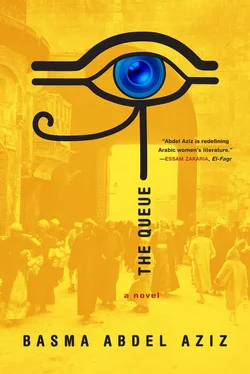The man in the galabeya rose to the occasion and began his thirty-first weekly lesson in support of the High Sheikh’s fatwa. In his opening remarks, he said that the fatwa represented the esteemed Committee, which included religious scholars of purest intention and infallible opinion. He added that to question them or gossip about matters of religion — as some fools were doing — was religiously impermissible.
He and his followers had arranged rows of chairs at the front of the queue to accommodate the growing number of listeners. After a prolonged debate over proper religious seating arrangements, the first row was designated for the women, so that they wouldn’t be harassed if they stood at the back. Ines sat front and center and listened with rapt attention. She wore a drab isdal over her everyday clothes, and it fell from the middle of her forehead down to her toes, so that every hill and valley of her body was concealed. After concluding the lesson and answering all questions, the man in the galabeya looked closely at the women and then launched into a prayer praising these modestly dressed believers who followed the path of righteousness, emphasizing what good wives and mothers they were.
He arose from his seat to distribute an array of small booklets to the women, with titles like The Nature of Women, Torment and Blessing in the Grave, Suffering the Temptation of Women , and Conjugal Rights . He gave Ines the whole collection, saying it was a small gift to welcome her into a sisterhood of repentance and to celebrate her return to the path of guidance and truth. The booklets would help her learn more about faith, the world, and religious practicalities.
He returned to his seat and spoke of the importance of the High Sheikh’s fatwa. It not only set matters straight, but also lifted people out of their ignorance and confusion by educating them on the vile conspiracies being hatched against the nation. He thanked and praised various centers and associations, all led by hardworking, God-fearing men, who had taken it upon themselves to lead the charge of societal reform down a path of righteousness. He concluded by declaring his solidarity with the Center for Freedom and Righteousness, and announced that he was a signatory of its most recent petition, which proposed that the intentions of the injured, and their religious and ethical commitment, needed to be monitored.
Yehya grew angry as he listened to Ehab describe the fatwa and the week’s lesson. He’d seen a change come over several people standing near him in the queue, even Ines, but he still wasn’t keen on Nagy’s suggestion to form an oppositional group, something like “The Honorable Injured Citizens Association,” or “The Righteous and Injured.” His mind was filled with a growing pain that painkillers could no longer alleviate, and the medicine itself knocked him out. It made him dizzy and unable to focus, so much so that he couldn’t even check in on Amani.
Ines hadn’t missed a single weekly lesson since committing herself to her new attire. She felt a deep sense of relief and was gradually accepted by a new crowd, which was somewhat different from the groups of women she’d known at her school. She joined them for social and spiritual activities, visited proselytizers, and attended religious gatherings and prayer groups. Most meetings were held outside the queue, and the women would gather in a clique and head to a designated car, which dropped them at the meeting place and returned them to the queue when it was over. She became immersed in it all and her fears began to fade, though she was still occasionally troubled by worrisome thoughts. Attending meetings meant she spent less time in the queue, and while she was no longer concerned about Shalaby, she had developed an interest in Yehya.
Meanwhile, the man in the galabeya channeled his efforts in two directions. He opened a small center near the queue to help people who wanted to obtain a Certificate of True Citizenship from the Gate. He had discovered that this was all that many people were waiting for, and he was sure that most of them would fail to meet the criteria. He also began to collect donations in support of Violet Telecom, which he regularly lauded during his lessons, as the company had declared its commitment to developing new services for its customers who could not afford them.
He asked Ines to help him reach as many women in the queue as she could, especially those who didn’t regularly attend his weekly lessons. She agreed right away and began working alongside him. They didn’t get off to a good start. Ehab and Yehya started an argument with the man in the galabeya , and they were quickly joined by Nagy, and the four of them exchanged a fierce barrage of insults. Ehab accused him of being financially corrupt, and he accused them of being morally bankrupt, hinting that the Center for Freedom and Righteousness’ petition applied to Yehya because of the injury that he was attempting to hide. It would likely lead him to be questioned before the Fatwa and Rationalizations Committee, convicted unanimously as an Untrue Citizen, and duly punished. The fight ended before either side had achieved a definitive victory, and no one had been physically harmed, but Ines was distraught. Yehya had been at the top of her list of people to approach for donations. Her situation felt so precarious, especially without someone to lean on, and Yehya seemed like a good man, perhaps even a decent marriage prospect. She knew he didn’t have a cell phone and hadn’t joined the Violet Telecom boycott, nor did he seem interested in doing so. Fundraising had seemed like a perfect way to get to know him.
She’d been successful in soliciting donations from the new arrivals, women who had just joined the queue and were ignorant of the phone-tapping scandal. She managed to convince two women to promise that they would attend lessons, and had collected a moderate amount of money from a few of the wealthier people. The man in the galabeya told her how impressed he was by her cleverness, and on the day of prayer he asked for her hand in marriage. She pretended to be flustered and surprised, and demurely looked down at the ground, as she’d always imagined she would do in such a situation, and then asked if he would allow her some time to consult her family. She left the queue the next day and went to her sister’s, having realized that she was too unsettled to spend the night alone in her big apartment. She stayed for days, but despite all their conversations she couldn’t reach a decision. Her sister wasn’t enthusiastic and didn’t encourage her to accept his proposal. From the way Ines had described him, the man didn’t seem like a good match for her at all.
Ines kept silent about the trouble she was in; she didn’t want to be scolded and didn’t want to frighten her sister, or deal with the consequences if she did. She called her mother and father to ask for advice, and discovered that they were more accepting than she had expected. She asked God for guidance and realized that she was comfortable with the idea of someone beside her, able to share her burdens, who she could lean on in times of need. The time she spent in her sister’s house further convinced her; her brother-in-law was clearly annoyed by having another person in their space, and she realized that she wouldn’t be able to stay there if she found herself in trouble.
As life in the queue went on, Amani’s life gradually broke down. She stopped going to work regularly, but her boss didn’t reprimand her or even ask why. One day he walked into her office and told her to type up a request for leave without pay. He told her to hand over all her customers’ telephone numbers to another employee, and was so keen to have her gone that he didn’t even check on whether she’d returned the office supplies, as was customary. She looked out the window, and in her reflection she saw two dark circles in place of her eyes. She slept only in scarce, sporadic spells, waking up terrified in the middle of the night, lying there for long minutes in the darkness, unable to see, her eyelids so heavy that she could not open her eyes.
Читать дальше











